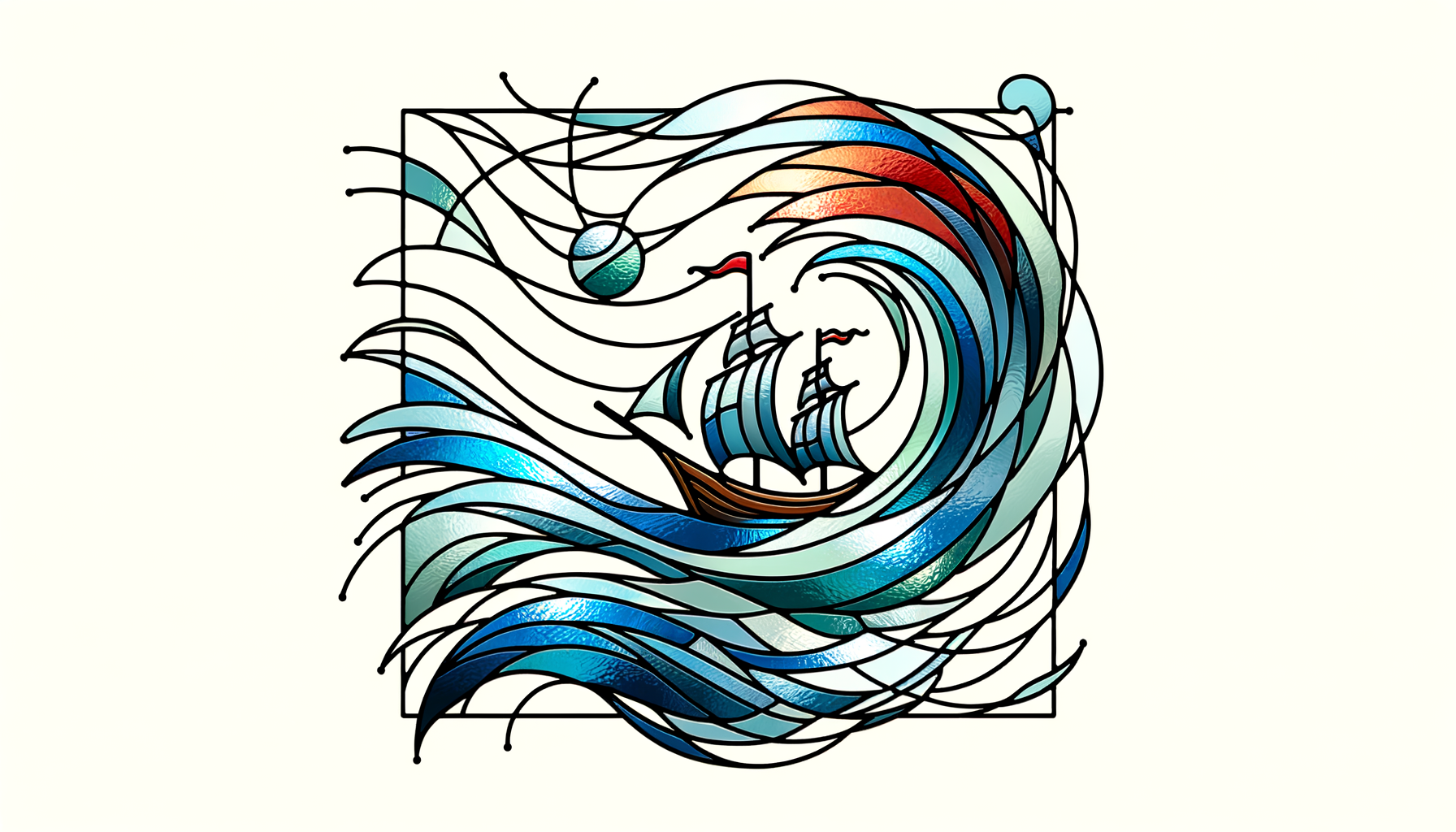There was a summer when I felt like a ship adrift in open waters—not lost, exactly, but uncertain of the course I was meant to chart. It was the kind of summer where you feel like you’re on the brink of something, but you’re not sure what. My friends in Boston were coupling off, talking about “big steps” in their relationships. Meanwhile, I had recently returned to Nantucket, trading cobblestones for sandy footpaths and wharfside dinners for rainy nights with my second drafts. I felt stuck: romantically, creatively, and in whatever intangible way makes a person think, I wasn’t made for this century. And then, I picked up a book that rewired my thinking in ways I never expected.
Its name? The Shipping News by Annie Proulx.
Now before you roll your eyes and say, “Of course the Maritime History Guy loves a book with ‘Shipping’ in the title,” let me say this: The book isn’t about boats or trade winds or catching the best tide. It’s about rebuilding your life after wreckage, about learning to navigate when you don’t even know what your compass looks like anymore. And it taught me more about dating, love, and relationships than any podcast, bestie heart-to-heart, or self-help guide ever could.
The Quoyle Question: Why Waiting for “Ready” is a Myth
At the heart of The Shipping News is a character named Quoyle—a self-described loser, failed journalist, and walking repository of bad luck. When his toxic marriage collapses and he’s left to raise two daughters alone, he reluctantly returns to his family’s crumbling ancestral home in a bleak Newfoundland town. It’s not exactly the setup for a rom-com, and yet—buried in his fumbling attempts at regaining his footing—I saw myself. That summer, I too felt like I had seaweed in my sails. Quoyle’s hesitancy, his constant self-doubt, mirrored my own endless, paralyzing refrain: Maybe I’m just not ready—ready to date seriously, ready for someone real, ready to be the best version of myself for somebody else.
What the book hit me over the head with was this: Waiting until you’re “ready” is a fool’s errand. Growth—the kind that makes you believe you’re worthy of love, or someday whole enough to hold another’s broken pieces—never arrives fully formed; it happens while you’re moving forward. For Quoyle, transformation didn’t happen in some solitary mountain cabin, reading paperbacks by firelight. It came as he stumbled toward connection with people in his quirky, salt-hewn community. It came through the vulnerability of letting people see him—his awkwardness, his scars, his humanity. And maybe (just maybe) growing into a better version of yourself only works when you stop obsessing over the blueprints and just start building, one shaky beam at a time.
Shipping News and Ghost Nets: Facing Emotional Hauntings
One of the recurring symbols in the novel is the “ghost net”—a curling, forgotten piece of fishing gear floating untethered in the ocean, waiting to snare something. Sometimes it was fish; sometimes it was debris. In the book, ghost nets came to symbolize old family traumas, the barbs of Quoyle’s failed marriage, and all those emotional tripwires we drag through life without realizing.
Reading The Shipping News helped me see my own ghost nets. Exhibit A: my tendency to measure every potential relationship against failed ones. Hadn’t I, too, let old heartbreaks (a high school girlfriend who suddenly “found herself” at summer camp, a warped slow burn in Boston that fizzled into ash when I refused to move faster) spool through my thoughts every time something new came along? Maybe you recognize this dynamic: You’ve run aground somewhere, whether it’s heartbreak, rejection, or a string of situationships, and you’re now convinced every future romance is doomed to crash on the same rocks.
What The Shipping News taught me, though, is that ghost nets can be untangled. It takes work, yes—good friends to mirror back your worth, maybe a solid therapist—but the debris doesn’t have to float in your waters forever. Over the years, I’ve learned that you can often start loosening those knots simply by asking yourself: What am I carrying that isn’t mine anymore? And what am I ready to cut loose?
Coastal Love Isn’t a Formula—It’s a Drift
Here’s the paradox that Annie Proulx nailed: Falling in love doesn’t look much like hoisting big sails into the wind or conquering storms. It looks, more often, like a long coastal drift. For Quoyle, love isn’t a flash of lightning—it’s a quiet, patient rebuilding beside a local woman named Wavey. (Yes, her name is Wavey. Stick with me.) They both carry their own bruises, but they don’t rush their union; instead, it blooms gradually, like wildflowers reclaiming an overgrown pasture. In a world of 10-second swipes and TikToks about “how to know they’re The One after date three,” the slow unfolding of their connection felt radical.
It got me thinking: What if love isn’t a “click” but a series of small observations made over time? What if compatibility grows like moss—slowly enough that you wake up one morning and realize it’s been thriving all along?
By reflecting on Wavey and Quoyle’s progression, I learned to stop expecting my romantic life to mimic the climactic cannon-fire of my favorite fictional romances. Instead, I looked for the quieter, more subtle signs: the steady spark of mutual curiosity, the calming sense of trust over transactional exchanges, the moments where you see someone's habits and think, I could build something here.
Takeaways from the Shipwreck
You don’t have to be a hopeless romantic—or a maritime nerd with strong cocktail party takes about harpoons—to glean life lessons from a book like this. What surprised me was how directly and practically it translated into my worldview about love, dating, and relationships. If you’ll indulge me just a little longer, let me distill the most life-changing realizations to a cheat sheet (because this is the internet, and we love lists):
- Stop Waiting for the Perfect Compass. Whether it’s finding time to date or starting something meaningful, you’re never going to feel “ready.” Show up messy. Figure it out along the way.
- Shed the Ghost Nets. Your past is a part of you, but it doesn’t have to be your anchor. Spend time sorting through the old feelings you’re hauling—then let some go.
- Love Is a Drift, Not a Race. You don’t have to feel fireworks on every first date. Look for someone who adds warmth and sunlight, even if it’s bit by bit.
- Find Your People. Whether it’s an idyllic Newfoundland fishing town or your local trivia-night crew, relationships thrive when they happen alongside community. Isolation breeds indecision—lean into connection.
- Embrace the Wreckage. Storms will come. Ships will break. Some of them might be your fault. The work of a relationship isn’t avoiding crashes—it’s deciding together how to rebuild.
Anchored by Possibility
By the end of The Shipping News, Quoyle isn’t magically transformed. (Spoiler alert: You don’t get closure tied up with a bow in beloved literary fiction.) But he does find something better—purpose, joy, and love that feels real this time. That summer, I closed the final page of that book and looked out over Nantucket Sound, a faint sunbeam splitting through the mist. I felt like I could breathe differently—less afraid to try, more willing to fail, more attuned to the slow rhythms of connection.
They say our favorite books stay with us like trusted companions. I’d argue that some even jump on board and help us steer for a while. For me, The Shipping News sits securely embedded in that mental bookshelf labeled “life-changing,” reminding me that even when life feels stormy, there’s power in moving forward, rebuilding, and staying curious about what lies beyond the fog. Every journey starts somewhere—why not here, in the drift?




















